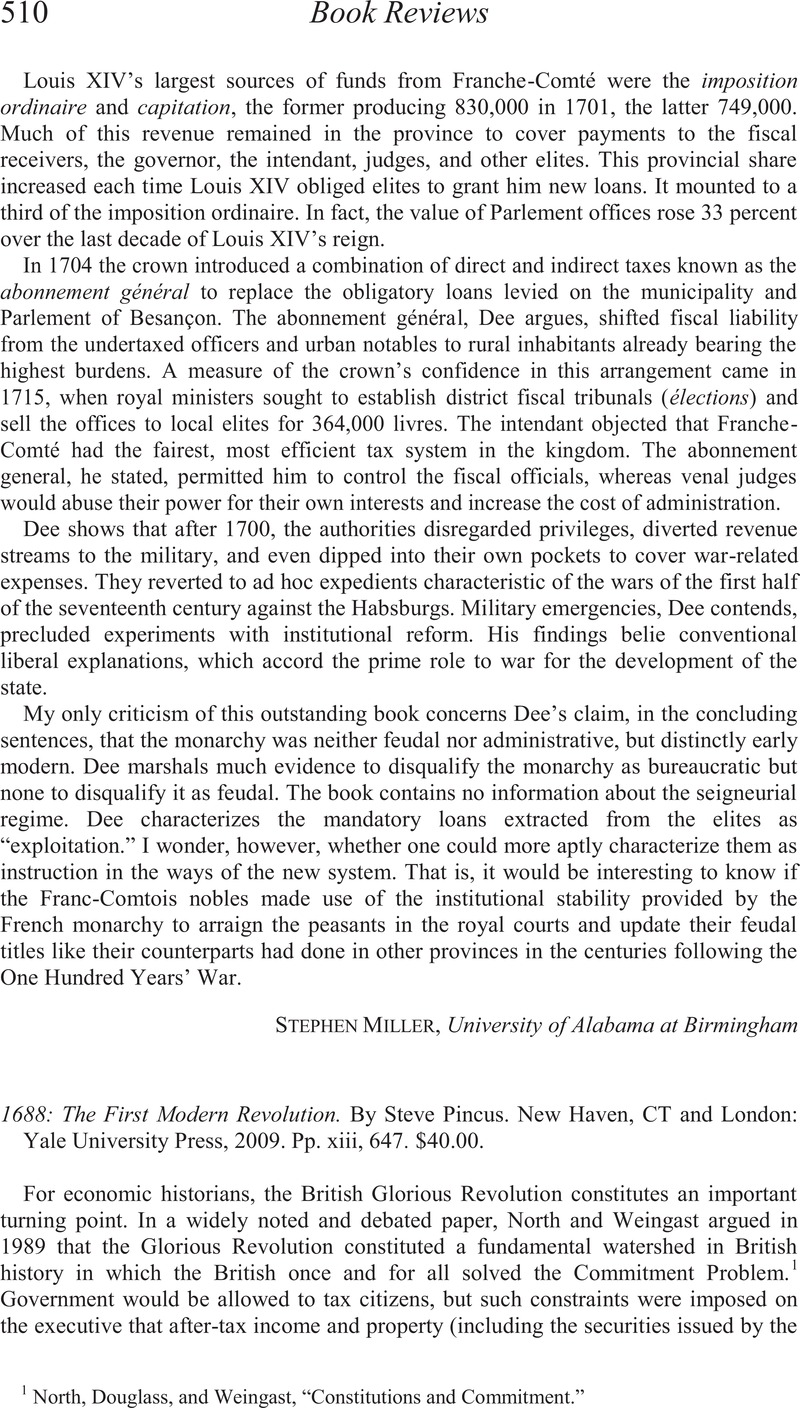No CrossRef data available.
Article contents
1688: The First Modern Revolution. By Steve Pincus. New Haven, CT and London: Yale University Press, 2009. Pp. xiii, 647. $40.00.
Review products
1688: The First Modern Revolution. By Steve Pincus. New Haven, CT and London: Yale University Press, 2009. Pp. xiii, 647. $40.00.
Published online by Cambridge University Press: 01 June 2010
Abstract
An abstract is not available for this content so a preview has been provided. Please use the Get access link above for information on how to access this content.

- Type
- REVIEWS OF BOOKS
- Information
- Copyright
- Copyright © The Economic History Association 2010
References
REFERENCES
Acemoglu, DaronJohnson, Simon and Robinson, James. “The Rise of Europe: Atlantic Trade, Institutional Change, and Economic Growth.” American Economic Review 95, no. 3 (2005): 546–79.Google Scholar
Allen, Robert C. The British Industrial Revolution in Global Perspective. Cambridge: Cambridge University Press, 2009.Google Scholar
Bogart, Dan. “Turnpike Trusts and the Transportation Revolution in Eighteenth- Century Britain.” Explorations in Economic History 42, no. 4 (Oct. 2005a): 479–508.Google Scholar
Broz, Lawrence J. and Grossman, Richard S., “Paying for Privilege: The Political Economy of Bank of England Charters, 1694-1844.” Explorations in Economic History 41, no. 1 (Jan. 2004): 48–72.CrossRefGoogle Scholar
Clark, Gregory. “The Condition of the Working Class in England, 1209-2004.” Journal of Political Economy 113, no. 6 (Dec. 2005): 1324. North, Douglass C. and Barry R. Weingast. “Constitutions and Commitment: Evolution of Institutions Governing Public Choice in Seventeenth-Century England.” The Journal of Economic History 49, no. 4 (Dec. 1989): 803–32.CrossRefGoogle Scholar
Goldstone, Jack. “Would the World be Modern if William III's Invasion of England in 1688 Had Failed?” In Unmaking the West: “What-If Scenarios That Rewrite World History,” edited by Tetlock, PhilipNed Lebow, Richard and Parker, Geoffrey, 168–96. Ann Arbor: University of Michigan Press, 2006.Google Scholar
Hoppit, Julian. A Land of Liberty? England, 1689-1727. Oxford: Oxford University Press, 2000, p. 329.Google Scholar
Quinn, Stephen. “The Glorious Revolution's Effect on English Private Finance: A Microhistory, 1680-1705.” The Journal of Economic History 61, no. 3 (Sept. 2001): 593–615; Nathan, Sussman and Yishay, Yafeh, “Institutional Reforms, Financial Development, and Sovereign Debt: Britain 1690-1790.” The Journal of Economic History 66, no. 4 (Dec. 2006): 906–35.Google Scholar


